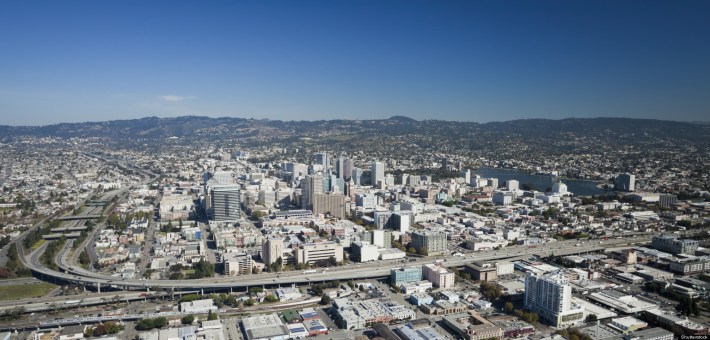
A group of planning-savvy Oakland residents and workers has formed Transport Oakland to advocate for sustainable transportation and livable streets.
With declining car traffic and exciting developments on the way like bike-share and bus rapid transit, the group says the growing East Bay port city could become a people-friendly mecca -- given the right leadership.
Transport Oakland "started informally,” said Liz Brisson, a spokesperson for the group, who works as a San Francisco transportation planner, along with some of the other members. “A group of planners and advocates got together to talk about what we would like to see in the city, and why there are problems preventing things from happening.”
While Transport Oakland is working with groups like Walk Oakland Bike Oakland, Bike East Bay, and TransForm, the group takes a different approach to organizing for better transportation choices, such as making candidate endorsements and offering nuanced recommendations on local transportation reforms. “It's an interesting group, and different than a typical advocacy group, in that a lot of people involved are planners or engineers that just happen to live in Oakland," said Brisson.
Unlike other similarly-sized cities, Oakland has no transportation department or director to oversee funds and projects -- its transportation planners work within the Public Works Agency. Its city council also has no transportation commission appointed to help inform decisions about transportation issues, and the city has no overall strategic plan or vision for transportation.
The city even has $15 million in earmarked transportation funds that haven't been used for unclear reasons, the group found in its research. The numbers come from audit reports from the Metropolitan Transportation Commission on Measure B transportation sales tax revenue [PDF] and the Vehicle Registration Fee program [PDF], both approved by Alameda County voters.
Transport Oakland decided that its most effective first action would be to encourage city leadership on improving transportation in the upcoming election. “There are three different levels of involvement that affect transportation outcomes,” said Brisson. “There are policymakers, there's staff, and there are advocates. We agree that Oakland could use more involvement from all three. We have specific ideas modeled after other cities about how transportation should be planned, funded, and delivered, and we need policy maker involvement to create those changes.”
Transport Oakland's first step was to interview and endorse candidates for mayor and the three city council seats that are up for election next month. “We're not a PAC (Political Action Committee), we're just volunteers,” said Brisson. But the group aims to influence city policymakers by publicly endorsing candidates with progressive views on transportation. In the interview process, they also aimed to educate candidates about smarter transportation policy.

The group's fact sheet [PDF] outlines a platform that city leaders can endorse, which includes ways to more effectively collect and distribute transportation funds, steps to improve Oakland's organizational structure around transportation, and near-term projects to champion, like the city's fledgling parklet program, East Bay Bus Rapid Transit, and the planned East Bay debut of Bay Area Bike Share.
“Bike-share is a huge opportunity for Oakland,” said Brisson. “The city's not in charge of it -- MTC is -- but it's going to take a lot of involvement by Oakland to provide the coordination needed to select and install locations here in the city. Oakland is hiring a dedicated staff position for this program, which is a great step in the right direction.”
A bus rapid transit line is also set to break ground in the East Bay next year to connect downtown Oakland and San Leandro, and Transport Oakland says leadership will be needed to see it through. "Most of the decisions are made," said Brisson, “but inevitably the closer you get to construction, the more people show up with concerns about construction impacts, or who say, 'I didn't know about this.' That's the kind of thing that policymakers need to be involved in: articulating the benefits of BRT to the public, and making sure that coordination is happening."
Such projects will rely on several potential revenue sources, including the $15 million in transportation funds that has not been spent.
"Think about that in the context of Measure BB," an Alameda County transportation sales tax measure on the upcoming ballot, said Brisson. “If that passes, it should bring $700 million to Oakland in its lifetime. We need policymaker involvement to direct responsible use of our existing resources. We need to create a pipeline of projects that can be delivered as these funds become available.”
Measure BB's precursor, Measure B, failed by a very narrow margin to gain enough countywide votes in 2012, with 66.53 percent of voters approving it -- just short of the 66.67 percent needed. But in Oakland, voters overwhelmingly supported it, with 76 percent approving it.
Transport Oakland's platform also calls for several changes to the city's organizational structure to better manage transportation. First is the creation of a transportation commission to issue transportation policy recommendations to the City Council, and to make the policymaking process more transparent to the public. Oakland's Bicycle and Pedestrian Advisory Committee was recently elevated to the status of a commission to meet MTC funding requirements.
“That's a good interim step,” said Brisson, “but its purview is strictly bicycle and pedestrian issues. You'd want to elevate this body to have oversight over transportation more broadly.”
Oakland also needs a transportation director "to organize and manage staff to carry out the vision established by the commission," said Brisson. "It could involve some moving of boxes that are currently organized differently within the Public Works Agency, and using funds earmarked for transportation purposes to bring in project development and delivery staff so that you have the people needed to get the projects done.”
Oakland also needs to establish a strategic plan for the transportation director to follow, said Brisson. While the city has a “Transit First” policy, a “Complete Streets” policy, and climate change goals like San Francisco, she said the city needs performance measurements to make sure they're being implemented.
The city is undertaking some efforts to design more people-friendly streets, but they're often watered down or even shut down. Last year, Oakland Planning and Building Director Rachel Flynn stopped the Latham Square plaza pilot project early, ignoring signs of success. Last month, the city also ditched its proposal for parking-protected bike lanes on Telegraph Avenue, opting instead for conventional bike lanes that disappear where they're needed most. This despite the fact that Telegraph has less traffic on it than it did forty years ago, before the nearby freeway was completed.
In fact, even without strong measures to encourage Oaklanders to change their transportation habits, the city has been experiencing a long decline in driving despite population growth. According to Transport Oakland, Downtown Oakland has seen a 25 percent decrease in car traffic over the past ten years, even as 10,000 new residents moved into the area. The city's wide streets seem more wasted on automobile-centric designs than ever.
“Since we have so many freeways in Oakland, we don't need our streets designed like freeways, too,” said Brisson. The time is ripe for low-cost measures to re-purpose street space for people, she said.
“In San Francisco, if you want to do a road diet, every inch of space is contested," said Brisson. "In five to ten years, as development comes in, that will become a lot harder to do [in Oakland], so building it out now is a really unique opportunity that we have to take advantage of."





